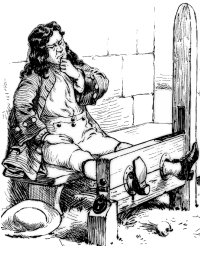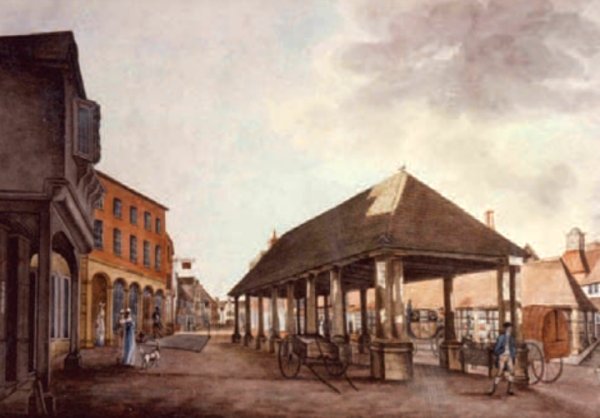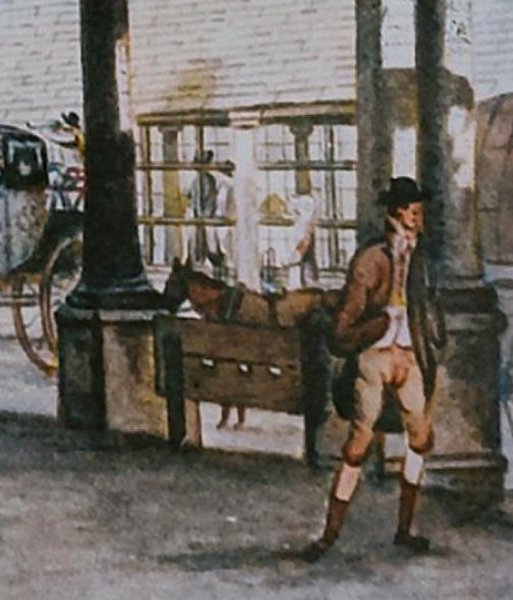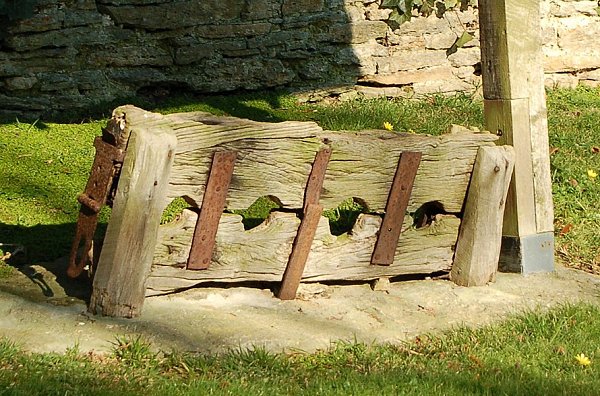Stocks & Whipping Post
Stocks & Whipping Post
Physical punishment involving public humiliation
Stocks were devices popular with civil authorities from medieval to as late as the middle of the nineteenth century, as a form of physical punishment involving public humiliation. The stocks partially immobilized its victims and they were exposed in a public place to the scorn of those who passed by. In Yeovil the town stocks were sited within the Market House in the Borough as seen in the painting below.
An earlier punishment frequently used in Yeovil was a public whipping - the whipping post also being sited in the Borough. As was the custom of the time, the crime did not have to be serious to warrant a whipping, as seen from the following account from the Quarter Sessions Records of 1614 "Order made by Alexander Ewens, John Farwell and William Swanton esquires, the 23rd April, 12 James (1614). Henry Creech of Mudford, the reputed father shall pay twelve pence weekly to the churchwardens and collectors of the poor every Saboth day after evening prayers. Dorothy Wootten the known mother of Henry the base child shall keep the child. Both parents shall enter into bonds of twenty pounds to perform this order. The said Dorothy Wootten shall be openly whipped at Evell (Yeovil) on the market day after the next Ivelchester Sessions."
At the Somerset Quarter Sessions held at Wells in May 1827, 12-year-old Edward Fox was found guilty of robbing the shop of bookseller Mr Sherring in Yeovil, “of a quantity of silver”. He was sentenced to three months imprisonment and to be publicly whipped in Yeovil marketplace. Another account records that he was whipped in Wine Street while tied to a water pump.
 The
stocks were used
as punishment
for minor
offences such as
drunkenness,
being rowdy,
fighting,
cursing, causing
minor damage to
property, etc.
For example,
tippling on a
Sunday during
public divine
service was, in
past times,
against the law
and it was the
general practice
in most towns
and villages for
the
churchwardens to
visit the
various public
houses during
the time of
church service
to ensure that
nobody was
drinking.
The
stocks were used
as punishment
for minor
offences such as
drunkenness,
being rowdy,
fighting,
cursing, causing
minor damage to
property, etc.
For example,
tippling on a
Sunday during
public divine
service was, in
past times,
against the law
and it was the
general practice
in most towns
and villages for
the
churchwardens to
visit the
various public
houses during
the time of
church service
to ensure that
nobody was
drinking.
In the stocks an offender's ankles, or sometimes their hands, would be placed and locked through two holes in the center of a board. Offenders were forced to carry out their punishments in the rain, during the heat of summer, or in freezing weather, and generally would receive only bread and water, plus anything brought by their friends. As well as being publicly humiliated in Yeovil's market square, offenders might occasionally have things other than insults thrown at them.
In 1753 the Churchwardens' accounts show a payment of £1 5s 4½d for "A New Stocks" and in 1759 1s 6d was paid for "A Lock for the Stocks".
In earlier times the Portreeve held a local court for minor matters, but latterly local JPs dealt with offenders in petty sessions. In 1830 Michael Dawe was confined for an hour in the stocks for drunkenness and disorderly behaviour and on 24 September 1846 a man named Stoodley was confined in the stocks for three hours for being drunk on a Sunday afternoon. This was the last occasion the Yeovil stocks were used.
The Market House was demolished in 1849 and the stocks were removed at the same time.
gallery

A painting made in 1810 of the Borough looking towards High Street which runs to the distance at left. The building at centre was the Market House, built in 1740, which contained the stocks.

An enlargement of the previous 1810 picture showing the stocks.

The stocks at North Cheriton, Somerset, photographed in 2011, shown as an example of stocks - Yeovil's would have been very similar in style and appearance. Other surviving examples close by include Tintinhull and Martock.